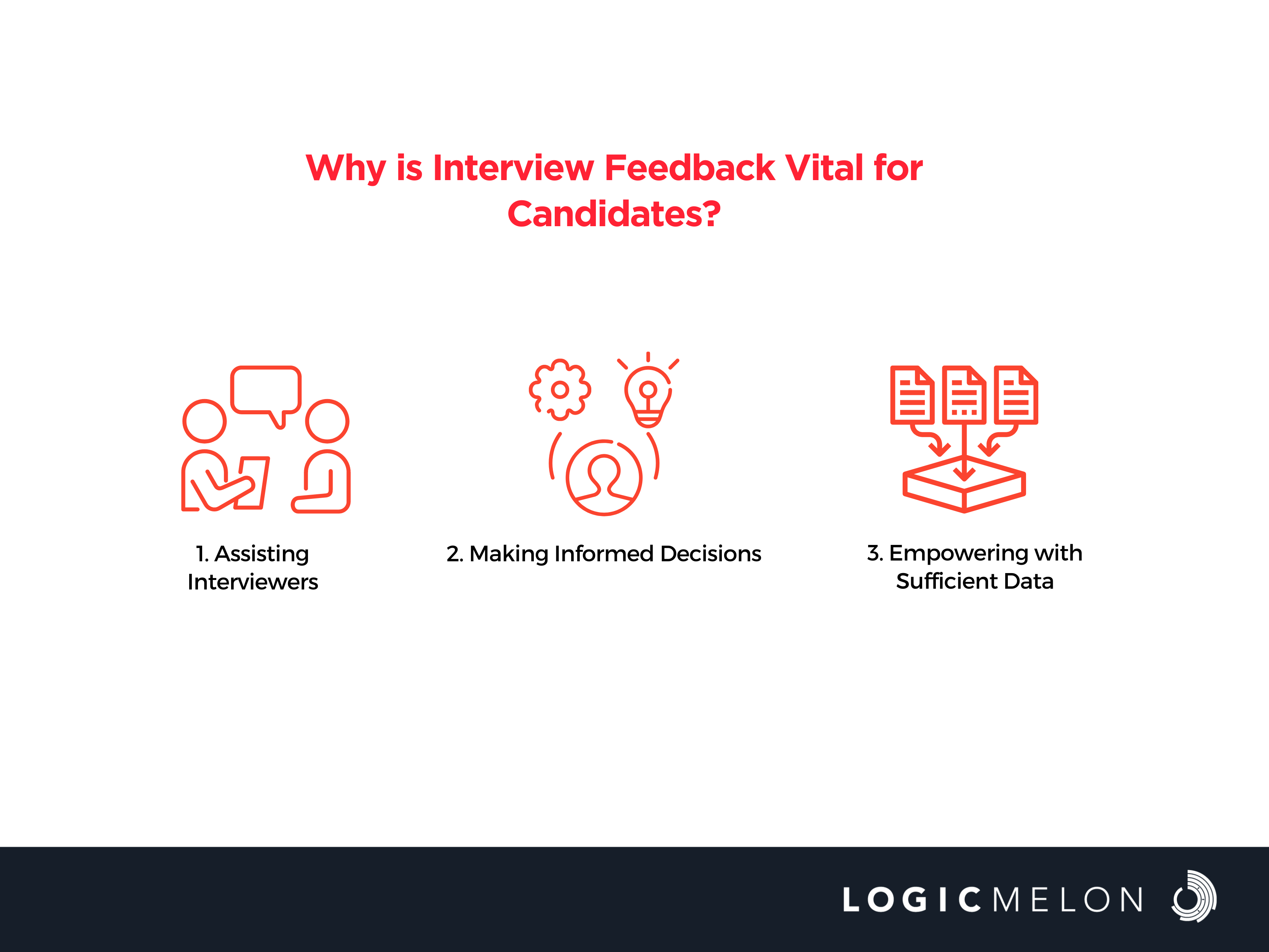How to Give the Best Interview Feedback
Attending interviews can be a nerve-wracking experience, not only for candidates but also for interviewers. Yes, you heard that right! Interviewers also face anxiety, but unfortunately, they don’t often get a chance to express it. Nevertheless, a successful interview should leave both parties satisfied. That’s where interview feedback comes into play. By providing valuable feedback, you can help another person learn from their experience and grow as a professional.
The Lowdown on Interview Feedback
Interview feedback is a process where the interviewer provides feedback to candidates about their performance through detailed notes. These notes are taken during the interview and meticulously edited throughout the day. The ultimate goal of interview feedback is to help candidates identify their weaknesses and foster their personal growth. However, it’s crucial to remember that the aim is to create a positive experience, not to demoralise candidates about their performance.
Why is Interview Feedback Vital for Candidates?

1. Assisting Interviewers
After interviewing numerous candidates, interviewers need time to reflect on their impressions and evaluate the candidates’ characteristics. These invaluable notes aid in identifying the key points discussed during the interview, enabling interviewers to assess the candidate’s potential and determine whether they would be a good fit for the organisation.
2. Making Informed Decisions
Organisations can make better decisions with the help of these comprehensive interview feedback notes. Additionally, interview feedback gives candidates an understanding of areas where they may need improvement. It also reflects the interviewer’s engagement in the process. Therefore, managers should embrace the practice of providing constructive feedback. However, it’s crucial to exercise caution when discussing a candidate’s limitations, as it could inadvertently hurt their feelings or demotivate them.
3. Empowering with Sufficient Data
Interview feedback provides candidates with valuable information about their overall performance during the interview. It acts as a summary, offering insights into how well they did and where they can enhance their skills. Constructive feedback empowers candidates, leaving them feeling more knowledgeable, confident, and ready for their next round of interviews.
Illuminating Examples of Interview Feedback
1. When the candidate is underqualified for the role
If a candidate doesn’t make it to the next round, it’s important to appreciate their efforts rather than demotivate them. Based on your observations, provide them with ideal interview feedback, covering all the relevant criteria and offering suggestions for improvement. Demonstrating genuine effort in creating effective interview feedback will be appreciated by the candidates.
2. When the candidate is overqualified for the role
While interviewers may come across candidates who are overqualified for the job, it’s important to consider whether these candidates will bring the necessary enthusiasm to thrive in the role. Remember, the most highly qualified candidate may not always be the best fit. It’s essential to ensure that the candidate’s knowledge, skills, and abilities align with the requirements of the role.
3. When the candidate is qualified for the role
Summarise the candidate’s interview and prepare notes to provide effective feedback based on their performance. Regardless of the outcome, interview feedback helps candidates understand where they stand and what steps they can take to improve their performance.
4. Providing suggestions for future interviews
Even if a candidate isn’t selected for a particular role, they can still learn valuable lessons from the experience. By offering effective suggestions for future interviews, you can contribute to their growth, and they will appreciate the team’s efforts and insights gained from the experience.
5. A Mismatch of Values: When Cultural Fit Goes Awry
Picture this: a company with a vibrant culture, where values are like the glue that holds everything together. But what happens when a candidate’s core values just don’t sync up? It’s like trying to mix tea with lemonade – intriguing, but the taste may not be what you expected. When choosing candidates who culturally fit into your system, it’s vital to consider not only their values, but also how their unique personalities and traits can help the team flourish and succeed.
6. Soft Skills: Unlocking the Power of the Interview
Ah, the mystical realm of skills! Interviewers know that it takes more than just hard skills to conquer the challenges of a job. Soft skills, my friend, are the secret sauce that adds that extra zing! A candidate with exceptional soft skills can navigate the treacherous waters of teamwork, communication, and adaptability with finesse. So, in a dynamic interview, be sure to shower praise upon all the dazzling skills they possess – both hard and soft!
7. CV vs. Performance: Bridging the Gap
Welcome to the ultimate showdown between what’s on paper and what’s in reality! As the interview unfolds, it’s crucial to spot any gaps between a candidate’s CV and their actual performance. Did they claim to be a coding maestro, only to fumble with the simplest algorithms? Or perhaps they touted their exceptional communication skills but turned into a deer caught in headlights when asked to deliver a presentation. Evaluating how candidates align their skills and experiences with what they’ve stated on paper is crucial, especially in structured interviews with standardised questions.
Frequently Asked Questions
1. Why does positive interview feedback matter, you ask?
Ah, my inquisitive friend, positive interview feedback is like a dose of sunshine on a cloudy day! Not only does it provide valuable insights, but it also guides co-workers in making informed hiring decisions. After all, who doesn’t appreciate a morale boost and a sprinkle of encouragement?
2. How do I craft effective interview feedback?
Ah, the art of feedback! The key, my dear interviewer, lies in ensuring that your feedback is impactful and comprehensive. Evaluate the candidate’s work experience, hard skills, soft skills, and leadership ability. Through this evaluation, you’ll gain a clear understanding of the candidate, enabling you to make an effective decision.
3. What makes good interview feedback shine?
Ah, the beauty of feedback done right! The aim of interview feedback is to help candidates identify areas for improvement. Good feedback comprises a summary of the interview, highlighting areas where the candidate can grow, and identifying specific skills they may lack or need to refine.
Closing Thoughts: Illuminating the Path to Better Hiring
Ah, the grand finale of the recruitment process! Interview feedback, my friend, is an indispensable and vital component. It provides timely, well-organised, and accessible insights that pave the way for better hiring decisions. When interviewing candidates, focus on aspects that demonstrate how they can contribute to the workplace. Remember, it’s not just about the end result; interview feedback is the beacon that guides us towards a productive hiring process. So, let’s conduct stellar job interviews and document feedback that is not only easy to read but also a joy for team members to understand. Onward to better hiring adventures.
LogicMelon
Award-winning recruitment software that will find, attract, hire and analyse the way you want to work. At LogicMelon, we have experienced software recruitment marketing specialists to help you build effective recruitment solutions supported by the best customer service you’ll find anywhere!
Email: sales@logicmelon.com or call LogicMelon (UK) +44 (0) 203 553 3667 (USA) +1 860 269 3089
Job Shadowing: A Comprehensive Guide
Job shadowing is spending time working next to a professional. Read on to learn some tips for preparing for a job shadowing session.
How to Overcome Communication Gap in the Workplace
Are you one of the many people who feel that there is a communication gap in their workplace? Read this blog to know more.
Methods of Job Analysis – A Brief Guide
It is important to understand how job analysis is performed and what it’s advantages are. Read more to know in detail!


